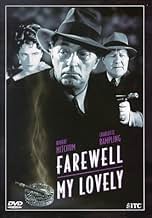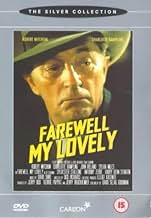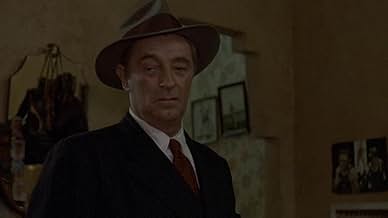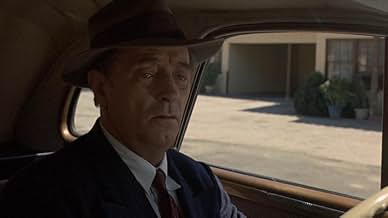PUNTUACIÓN EN IMDb
7,0/10
10 mil
TU PUNTUACIÓN
El detective privado de Los Ángeles, Philip Marlowe, es contratado por el convicto en libertad condicional Moose Malloy para encontrar a su novia Velma, exbailarina de discoteca.El detective privado de Los Ángeles, Philip Marlowe, es contratado por el convicto en libertad condicional Moose Malloy para encontrar a su novia Velma, exbailarina de discoteca.El detective privado de Los Ángeles, Philip Marlowe, es contratado por el convicto en libertad condicional Moose Malloy para encontrar a su novia Velma, exbailarina de discoteca.
- Dirección
- Guión
- Reparto principal
- Nominado para 1 premio Óscar
- 1 premio y 3 nominaciones en total
Jimmy Archer
- Georgie
- (as Jimmie Archer)
Reseñas destacadas
L.A. of June 1941 as it was depicted in the Raymond Chandler's novel of the same title is filled with the dark secrets of the past that better stay uncovered. Philip Marlow, PE (Robert Mitcum) takes a job to find a vanished girlfriend of the felon Moose Malloy, and he has no idea what will follow. As Marlow searches for Velma Galento, he has to deal with a beautiful but cold and calculating seductress (Charlotte Rampling - young, sensual and dangerous), a jealous corrupt detective (Stanton), an old alcoholic girlfriend (Sylvia Miles in one of her two Oscar nominated performances, second - the shortest in the history of Oscars, for "Midnight Cowboy"), and a buffed thug (Sylvester Stallone -- it was fun to see him before he became a star of Rocky and Rambo).
This adaptation of Raymond Chandler novel features action, suspense, humor, mystery and Robert Mitchum in one of his best performances as a man struggling with cynicism, hatred, and betrayal.
This adaptation of Raymond Chandler novel features action, suspense, humor, mystery and Robert Mitchum in one of his best performances as a man struggling with cynicism, hatred, and betrayal.
This version of Raymond Chandler's classic detective novel is more faithful to the original book than the 1940s version filmed as 'Murder, My Sweet', and includes some of the racial and sexual aspects that weren't able to be included earlier. However despite being more faithful for me it still isn't as entertaining. And Robert Mitchum in his prime could act Dick Powell off the screen, but unfortunately as good as Mitchum is in this movie it's about twenty years too late for him to play Philip Marlowe. If Mitchum had starred in 'Murder, My Sweet' it would might have been THE definitive 1940s Noir, but comparing the two versions as they stand, Powell beats Mitchum hands down. Even so, there is a lot going for 'Farewell, My Lovely' and it is quite an underrated movie. Mitchum may be too old but he is still compelling, and the supporting cast is first rate, and includes veteran character actor John Ireland, Charlotte Rampling ('Zardoz'), Harry Dean Stanton ('Repo Man'), Sylvia Miles ('Midnight Cowboy'), Anthony Zerbe ('The Omega Man'), a pre-'Rocky' Sly Stallone, Joe Spinell ('Maniac') , Rainbeaux Smith ('Caged Heat') and even pulp fiction legend Jim Thompson. If you MUST choose between the two versions I'd go for 'Murder, My Sweet', but 'Farewell, My Lovely' is still a very good movie. Watch them both, they make a hell of an interesting double bill!
This re-make of Raymond Chandler's work has the edge on the 1944 film. Robert Mitchum's face fits the film perfectly. His ageing hard boiled-looking features look like a relief map of the Rocky Mountains! In this movie Mitchum was as good he has ever been. He got better as he got older. What I also liked was the haunting but soulful musical score, at the beginning and at the end.
In the closing scene an atmosphere of rising crisis that seems to hang in the air; created by the soulful musical score. Marlow with the case all wrapped up and himself at a loose end; in the amusement centre playing the machines, picks up a discarded newspaper with "Tokyo" in bold print as the front page headline. Was this the late hours of the 6th of December in Los Angeles? A sailor and his girl, and a soldier in the background makes it seem so. Both the sailor and the soldier, and the whole of America blissfully unaware, that a Japanese armada has shaped a easterly course
across the North Pacific. That scene coupled with the soulful musical score is like a forlorn-sounding and doom-laden overture to what is about to happen with surprising and devastating suddenness on the following but quiet Sunday morning in Hawaii. It is not surprising that one of the songs is titled, "Sunday".
In the closing scene an atmosphere of rising crisis that seems to hang in the air; created by the soulful musical score. Marlow with the case all wrapped up and himself at a loose end; in the amusement centre playing the machines, picks up a discarded newspaper with "Tokyo" in bold print as the front page headline. Was this the late hours of the 6th of December in Los Angeles? A sailor and his girl, and a soldier in the background makes it seem so. Both the sailor and the soldier, and the whole of America blissfully unaware, that a Japanese armada has shaped a easterly course
across the North Pacific. That scene coupled with the soulful musical score is like a forlorn-sounding and doom-laden overture to what is about to happen with surprising and devastating suddenness on the following but quiet Sunday morning in Hawaii. It is not surprising that one of the songs is titled, "Sunday".
The choice of Mitchum for the lead role really did work. The novel suggest a tired Marlowe, who has had enough of being "detective to the stars". He wants to get out of his seedy little life, and change things, but instead, he gets wrapped up in another case. Mitchum's hang dog expression and tired wise guy act sums up the depression of the fallen hero. This is not the smooth talking Bogart, not the finely clipped and smooth Powell, but a harder, more experienced Marlowe, a man more aware of his own downfall. As he says to knulty, what he need is a nights sleep, what he needs is another drink. After watching this truly excellent recreation of late forties LA, I'm not sure that I couldn't agree with him.
Ah yes, and Charlotte Rampling and the sometime Thelma really was "cuter than lace pants"
Ah yes, and Charlotte Rampling and the sometime Thelma really was "cuter than lace pants"
In the wake of 'The Long Goodbye' and, especially, 'Chinatown', there was a profusion in the mid- to late-70s of recreated films noirs of the Chandlerian bent, many featuring aging stars. 'Farewell My Lovely' is one of the best - while it does not reek of the depravity of Dmytryk's 1944 version, starring Dick Powell, it is broader in scope, and truer to a kind of lived-in realism, as opposed to hard-boiled iconography. It's nice to see 1940s L.A. close to what it might have looked like, and not the vague dreamworlds presented by classic noir. it would be a mistake to assume that this is a progressive, or revisionist movie - while it scores well in its treatment of race, the fundamental misogyny of Chandler's source novel and Dmytryk's film lingers. Indeed, it is less palatable, in that 40s Hollywood made its villainesses glamorous, charismatic and desirable; Charlotte Rampling seems barely to exist on screen, a mere assemblage of corruption and cold amorality.
The hard-boiled detective fictions of Dashiell Hammett and Raymond Chandler were created in conscious opposition to the reactionary puzzles of the English Golden Age (eg Agatha Christie), which were exercises in asserting order and social control. Chandler tried to express a bleaker reality, one where arbitrary violence and corruption is not so easily contained, where smaller crimes may be solved, but society itself is rotten, diseased, irredeemable. Chandler pits his hero Philip Marlowe against this malaise, tough, solitary, misanthropic, frequently compared to medieval knights, as hopelessly out of his time as Don Quixote.
Chandler's novels are completely filtered through the prejudiced narration of Marlowe, so instead of realism we get a barely controlled expressionism, riddled with ideology. Marlowe is unable to trust anyone, and defines himself against everyone else, the Other, especially women and blacks. This is a subtext in the novel, but RIchards foregrounds it in the early scenes of this film. When Marlowe enters a black neighbourhood investigating Velma, he is very uncomfortable in an alien environment. Although, as a detective, he has the freedom to navigate the city, to access both poor black neighbourhoods and obscenely wealthy white mansions in a way neither one of these nor the other can, he is still constrained by ideology, the ideology of his times - he is not as apart from the corruption as he thinks. And so we frequently see him indoors, even imprisoned, by cops and criminals alike - like a conservative, everything is connected for Marlowe, except everything stinks.
This making mental states physical is important for a narrative seen through its hero's head. It puts us on our guard, distances us from Marlowe in a way Chandler never lets us, allows us to be more critical. Another device is the bizarre use of narrative voiceover. This seems conventional enough, Marlowe telling us the story, controlling, interpreting, often verbatim from the book. But his voiceover is broken - he starts addressing us, then, within that, he tells Nulty a story; so that the viewer is at two removes from a story that we only have it's teller's word for its veracity. In its modest way, the film DOES have revisionist aspirations.
Unlike Altman's film, 'Farewell' is purely enjoyable on the level of a murder-mystery thriller - the plot is satisfyingly, Chandlerianly (sic?) opaque; there are sufficient interesting supporting characters; the violence seems quaintly 1940s; the music is exciting. The film, therefore, would be pleasant, but harmless, except for one crucial element: Robert Mitchum, America's greatest actor. His aging Marlowe might be more appropriate to 'The Long Goodbye', but this is an astonishing portrait of middle- giving on to old-age, a study of a man struggling with cynicism, trying to maintain order (wisecracks; narration; frequent references to baseball, a game with rules) and humanity (the kid) in a world that only offers diabolic inversions of each.
Even more resonantly, the film is a film about film noir, about acting, about Robert Mitchum, soon to become famous in the period represented, soon the embodiment of the doomed noir hero. The Chandlerian dialogue that works wonderfully on the page can seem corny and stilted when spoken, but Mitchum pulls it off with melancholy beauty. He is the only screen Marlowe that seems like an actual human being who has lived - not even Bogie quite managed that.
The hard-boiled detective fictions of Dashiell Hammett and Raymond Chandler were created in conscious opposition to the reactionary puzzles of the English Golden Age (eg Agatha Christie), which were exercises in asserting order and social control. Chandler tried to express a bleaker reality, one where arbitrary violence and corruption is not so easily contained, where smaller crimes may be solved, but society itself is rotten, diseased, irredeemable. Chandler pits his hero Philip Marlowe against this malaise, tough, solitary, misanthropic, frequently compared to medieval knights, as hopelessly out of his time as Don Quixote.
Chandler's novels are completely filtered through the prejudiced narration of Marlowe, so instead of realism we get a barely controlled expressionism, riddled with ideology. Marlowe is unable to trust anyone, and defines himself against everyone else, the Other, especially women and blacks. This is a subtext in the novel, but RIchards foregrounds it in the early scenes of this film. When Marlowe enters a black neighbourhood investigating Velma, he is very uncomfortable in an alien environment. Although, as a detective, he has the freedom to navigate the city, to access both poor black neighbourhoods and obscenely wealthy white mansions in a way neither one of these nor the other can, he is still constrained by ideology, the ideology of his times - he is not as apart from the corruption as he thinks. And so we frequently see him indoors, even imprisoned, by cops and criminals alike - like a conservative, everything is connected for Marlowe, except everything stinks.
This making mental states physical is important for a narrative seen through its hero's head. It puts us on our guard, distances us from Marlowe in a way Chandler never lets us, allows us to be more critical. Another device is the bizarre use of narrative voiceover. This seems conventional enough, Marlowe telling us the story, controlling, interpreting, often verbatim from the book. But his voiceover is broken - he starts addressing us, then, within that, he tells Nulty a story; so that the viewer is at two removes from a story that we only have it's teller's word for its veracity. In its modest way, the film DOES have revisionist aspirations.
Unlike Altman's film, 'Farewell' is purely enjoyable on the level of a murder-mystery thriller - the plot is satisfyingly, Chandlerianly (sic?) opaque; there are sufficient interesting supporting characters; the violence seems quaintly 1940s; the music is exciting. The film, therefore, would be pleasant, but harmless, except for one crucial element: Robert Mitchum, America's greatest actor. His aging Marlowe might be more appropriate to 'The Long Goodbye', but this is an astonishing portrait of middle- giving on to old-age, a study of a man struggling with cynicism, trying to maintain order (wisecracks; narration; frequent references to baseball, a game with rules) and humanity (the kid) in a world that only offers diabolic inversions of each.
Even more resonantly, the film is a film about film noir, about acting, about Robert Mitchum, soon to become famous in the period represented, soon the embodiment of the doomed noir hero. The Chandlerian dialogue that works wonderfully on the page can seem corny and stilted when spoken, but Mitchum pulls it off with melancholy beauty. He is the only screen Marlowe that seems like an actual human being who has lived - not even Bogie quite managed that.
¿Sabías que...?
- CuriosidadesIn the novel, Philip Marlowe was in his 30s. Robert Mitchum, who plays him in this film, was 57.
- PifiasWhen Marlowe (Robert Mitchum) drives up to Mrs. Grayle's home (Charlotte Rampling), the front entrance is obviously double doors but when the butler is shown opening it from the inside, it is clearly a single door.
- Citas
Philip Marlowe: [voiceover] The house itself wasn't much. It was smaller than Buckingham Palace and probably had fewer windows than the Chrysler building.
- ConexionesFeatured in Proini peripolos (1987)
- Banda sonoraI've Heard That Song Before
Words and Music by Jule Styne and Sammy Cahn
Sung in the dance hall at the opening.
Selecciones populares
Inicia sesión para calificar y añadir a tu lista para recibir recomendaciones personalizadas
- How long is Farewell, My Lovely?Con tecnología de Alexa
Detalles
Taquilla
- Presupuesto
- 2.500.000 US$ (estimación)
Contribuir a esta página
Sugerir un cambio o añadir el contenido que falta

Principal laguna de datos
By what name was Adiós, muñeca (1975) officially released in India in English?
Responde
































